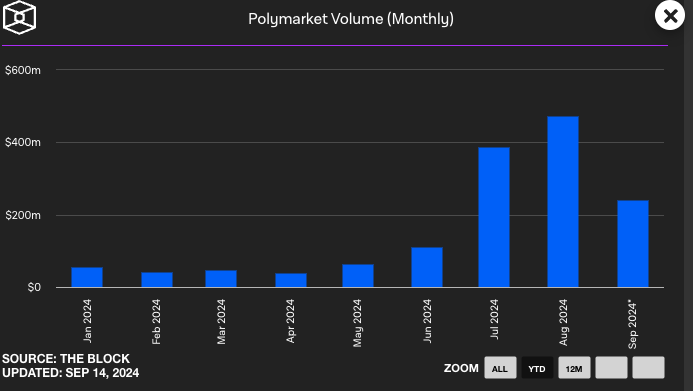As the U.S. presidential election enters its countdown, the popularity of the decentralized prediction platform Polymarket’s prediction market for the 2024 U.S. presidential election has also risen. It has accumulated a total of nearly US$900 million in bets. According to data provided by the platform, the current U.S. Vice President President and Democratic presidential candidate Kamala Harris leads the race with about a 50 percent chance of winning, attracting more than $127 million in bets.
Warning: Any mention in this article about the gaming mechanisms of Polymarket and other prediction platforms is purely for research and reporting purposes. It is not recommended to participate in candidate betting involving election regulations in different countries. Gambling is illegal in most countries.
CFTC warns: The wave of gambling in the US presidential election will harm the public interest!
According to statistics from The Block’s data dashboard , the US presidential election has significantly boosted Polymarket’s growth. The platform reached all-time highs in trading volume and number of active traders in August, with $472.84 million and 63,620 active traders respectively. As of September 13, the platform's cumulative trading volume reached $1.75 billion, showing Polymarket's amazing growth during this time.

On the other hand, the legal battle between the U.S. Commodity Futures Trading Commission (CFTC) and market prediction platform Kalshi continues to escalate. Kalshi applied to list its presidential election contract last year, but was immediately blocked by the CFTC. Kalshi subsequently filed a lawsuit and last week won the lawsuit.
However, the CFTC did not give up and quickly applied for an emergency stay order in an attempt to prevent Kalshi from immediately listing its election contract, but failed in this case as well. However, the contracts remained online on Thursday but were temporarily suspended while the Court of Appeal considered an emergency stay.
Kalshi expressed strong opposition to the suspension and said such measures would cause "irreparable harm" to Kalshi. In its latest filing, the CFTC refuted Kalshi's claims, citing financial losses related to allowing election gambling in the United States. The harm is insignificant in comparison. The CFTC warned:
Election gambling can cause serious harm to the public interest, including market manipulation and undermining election integrity.
One step closer, the CFTC has proposed a blanket ban on all trading of election contracts, but that plan could be affected by a district court ruling. The ruling relied on a Supreme Court ruling that limited regulators’ interpretive powers, which could have wide-ranging implications for the cryptocurrency industry.
Experts at Galaxy Digital note that due to the Supreme Court ruling and the lack of clear new legislation, the powers of federal agencies may be further restricted, which may have far-reaching consequences for the crypto industry.
Gamblers frequently arrested on chain gambling in Taiwan
Returning to Taiwan’s attitude towards gambling on political outcomes, Taiwan has adopted active sanctions. Within two months before the presidential election at the beginning of the year, the prosecutors and prosecutors issued a lawsuit under Article 88-1 of the President and Vice President Election and Removal Act. Items 1 and 2, regarding election gambling on the Internet, more than 30 gamblers involved have been arrested .
At that time, the prosecutor reminded that those who engage in gambling based on election results may be sentenced to up to 5 years in prison and fined NT$500,000; those who participate in gambling may be sentenced to up to 6 months in prison and fined NT$100,000. Fines are imposed, and people should not take action against the law.
How Taiwan will face the development of prediction platforms such as Polymarket in the future, and how to control or embrace it, will become an issue of continued concern in the market.







